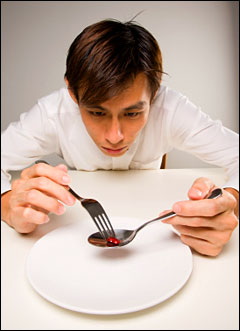Dear Umbra,
I recently became a vegetarian for environmental reasons. Everyone says I should start eating soy products and tofu. But doesn’t soy come from evil industrial farms in Iowa? I thought the idea was to increase biodiversity, not just eat the same thing 20 different ways. Also, can I keep eating eggs and milk?
Ben T.
New Hampshire
Dearest Ben,
Why are people so dang bossy about food? There’s a vein of “food as personal savior-ism” in the U.S., and it can be quite annoying. Umbra is no exception, admittedly, but we hope to limit our bossiness to environmentally focused dictates. Good job on going vegetarian — I hope you are enjoying your meals! And you’re right: Biodiversity is good for you, both inside and out.

I traded my burger for this?
There are several reasons vegetarianism is a benefit to the environment. Large-scale meat production is great in that it provides relatively cheap, plentiful meat for those who want it. But, as you probably know, producing meats en masse — in huge concentrated animal feeding operations, or CAFOs — also wreaks havoc on air and water quality, is believed to be a major contributor to greenhouse-gas emissions, and has sundry human health implications ranging from overexposure to antibiotics to clogged arteries. Hooray for those who can stop eating meat.
Because we’re accustomed (nay, nearly brainwashed) into thinking that hefty helpings o’ burger et al are life necessities, we still tend to organize our food thoughts in a meaty way, and think of dinner as a hunk of protein accompanied by a lonely veggie and starch. I know I do. Here is where your excellent summation of dietary goals can come in handy for all striving meat reducers: biodiversity on the plate. No, you don’t need to substitute soy on a one-to-one basis for the pork, beef, chicken, and other animals you’re foregoing. We already get plenty of soy as a mystery ingredient in our processed foods. And you’re right: It’s largely grown on huge, monocropped conventional farms. It’s also fairly certain that any non-organic soy is genetically modified, and you may not wish to join in the poorly regulated GM experiment.
The answer? By all means, mix it up with all sorts of beans as well as protein-filled vegetables, nuts, and dairy products, if you wish. Or try no protein at all once in a while. The USDA, purveyor of such cultural icons as the food pyramid, tells us to have 50 grams of protein a day, and nicely provides searchable databases that list nutrients in thousands of foods. Let’s see: One piece of unfrosted chocolate cake from a box has about 5 grams of protein. Ten slices of chocolate cake and you’re set for your daily protein needs.
A good cookbook will also help you with diversifying your veggie diet beyond soy. Regular readers know I like Deborah Madison’s Vegetarian Cooking for Everyone. I’m also newly engrossed (as I mentioned last week) in Mark Bittman’s How to Cook Everything Vegetarian. (Combine those two books and I’m sure everyone can cook everything vegetarian.) Other readers certainly will have suggestions (bring ’em on!). In the meantime, if you happen to come across a decent used book store, it may have classics like Laurel’s Kitchen by Carol Flinders et al, which comes straight out of ’70s Berkeley, with comprehensive nutritional tables (or pick up the sequel, The New Laurel’s Kitchen).
As to the dairy and eggs — a key problem, again, is the fact that they’re produced by large-scale factory-farm ops, which have limited pollution controls and cause all manner of other woes. If you can cut out the dairy and eggs, more power to you. But if you can’t, Bossy Umbra has her usual refrain: Buy local, buy organic, buy from small-scale producers. You live in New Hampshire, thus these options are available to you. Have fun eating divergently, differently, and deliciously.
Supportively,
Umbra

